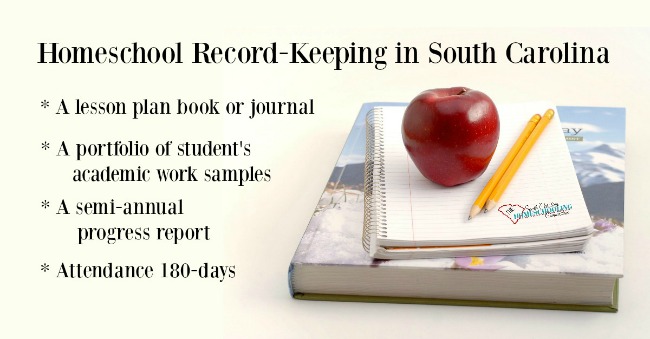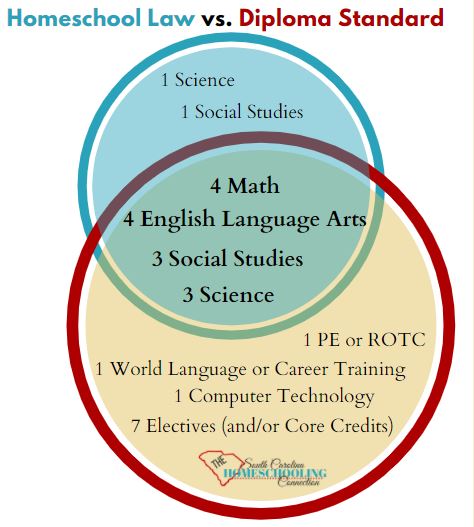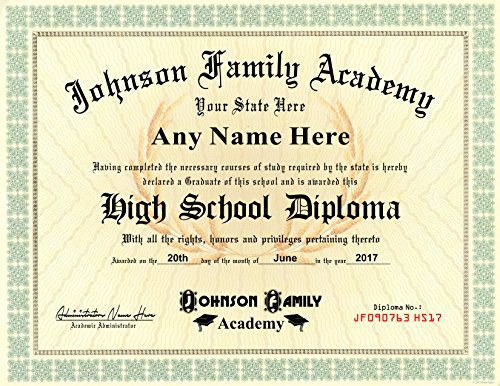We’ve talked before about High School Record-Keeping--with the SC Diploma standards in mind. Let’s dig a little more into the differences between the homeschool requirements vs diploma standard. What’s the difference anyway?
If your student is not going to college. If your student is burned out on academics and ready to be done. If your student would rather drop out than finish high school.
Then, you might be asking yourself:
How do you know when your homeschooler is ready to graduate? What’s the law require–and is it enough to open the doors of opportunity?
Consider the goals your student has and could ever possibly have. Consider whether the homeschool requirements vs. diploma standard will get your student to those goals.
Homeschool Requirements
When you choose to homeschool, there’s some minimums that are required by law. You have to document 180 days of attendance which is an equivalent to the compulsory attendance days in a year. You have to cover some basic subjects: Reading/Writing, Math, Science and Social Studies. The parent maintains:
- A daily log of learning activities (a lesson plan or journal)
- Some samples of the work (it’s called a portfolio)
- A semi-annual progress report (could be a report card, checklist or summary paragraph).
You’re really only required to do this basic minimum, even when you get to high school. The subject specify that Reading/Writing switches titles to Literature/Composition. But, it’s still the same basic subjects to cover, until the student turns 17 or is “graduated”.
Huddled in the corners of homeschool discussion forums, you’ll find advocates for this minimum standard. That’s all the law says, so that’s all you need to do. You can issue a parent-made diploma and declare the student “graduated”.
Technically that’s true. According to the letter of the law.
But, it doesn’t open any doors of opportunity if they change their mind later and want to go into the military or go to college. Sometimes jobs will want proof of high school equivalency. They’ll have to go get your GED, which is a test that shows an equivalent educational level as the high school diploma.
More about the “Minimum”
I think the law is oddly specific and yet somewhat ambiguous. The legislators went to very specific details about what they mean as a “minimum education”. But, it encompasses Kindergarten thru 12th grade. So, the content of the subjects varies greatly along the way.
They started to get a little bogged down with the variations in subjects, when they realized Reading and Writing is more involved in the upper grades. So, they included the title change for those subjects to be called Literature and Composition in 7th-12th grades.
I can only imagine if they had gotten more specific about what the minimum means for high school. They would have to clarify what to cover in Science, Social Studies and Math too. As if the code of law isn’t already clunky and confusing.
I choose to believe that they meant for homeschoolers to have an equivalent education as public school students. So, I recommend that we follow the spirit of the law, by aiming for the diploma standard as the minimum requirements.
As a homes educator, you can create an educational resume (or transcript) that will open the doors of opportunity. Your homeschool graduate doesn’t have to take the GED to prove their educational level when they have a transcript. Many associations also offer or require transcript assistance as part of their policies (and SC Connection also offers this service if your association does not).
 Compare the Diploma Standard
Compare the Diploma Standard
Homeschool law has 4 basic subjects each year of high school. It’s a total of 16 courses:
- Literature/Composition (or English Language Arts)
- Science
- Social Studies
- Math
The diploma standard has a total of 24 credits as the minimum. So you can include 8 more courses and be a bit more specific about your course titles for the subject content.
- 4 English credits
- 4 Maths (usually, Algebra 1 & 2, Geometry, Precalculus)
- 3 Sciences (2 lab Sciences)
- 3 Social Studies (US History, Economics/Government & 1 more)
- 1 Physical Education (or ROTC or Health)
- 1 Computer Technology
- 1 World Language or Career Training
- 7 Electives (which could include additional core courses)
Even if your student doesn’t want to go on to college, it’s worth the time and effort to prepare an academic resume for them. So if they change their mind later on–years later sometimes–they have the necessary educational records they need.
Consider the goals your student has and could ever possible have. Consider whether the homeschool requirements vs. diploma standard will get your student to those goals.
The law doesn’t require us to prepare a transcript or even that our education should be equivalent to the high school diploma. But, if we want the doors of opportunity to open for our grads, then we do need some kind of proof of high school equivalency.
Read more about How to Create Your Own High School Credits:
Home School Student High School Diploma – Personalized with Your Info – Premium Qaulity – Comes with Certificate Folder








 Compare the Diploma Standard
Compare the Diploma Standard







 NCAA Tutorial Workshop
NCAA Tutorial Workshop Homeschool Proms and Dances
Homeschool Proms and Dances How to Avoid the Grammar Police
How to Avoid the Grammar Police Class Ranking Policies: To Rank or Not to Rank?
Class Ranking Policies: To Rank or Not to Rank?




Speak Your Mind